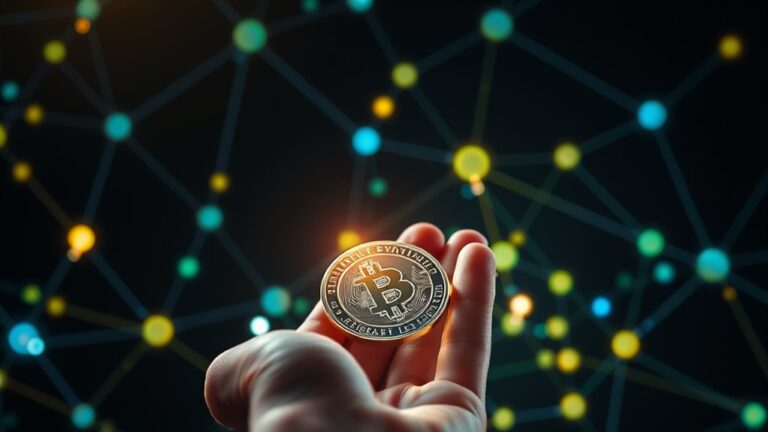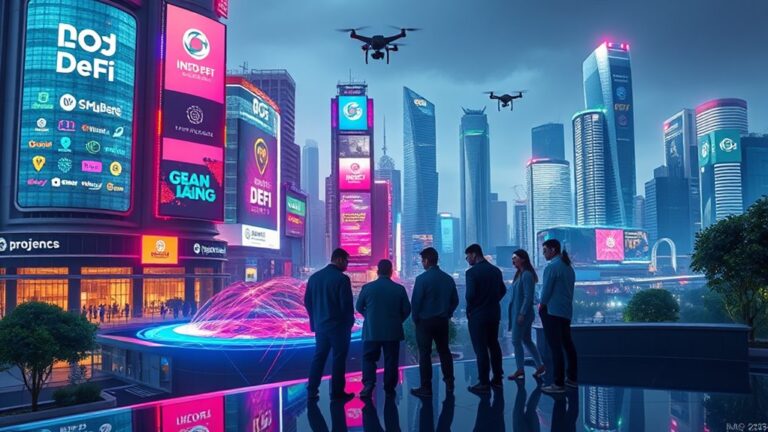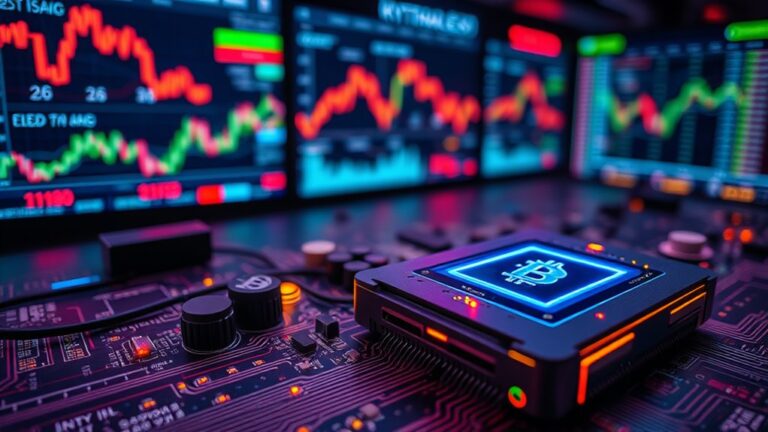
What Is a DAO and How Does It Work?
A DAO (Decentralized Autonomous Organization) is an internet-native entity governed by its members rather than a central authority. It operates through blockchain technology and smart contracts that automatically execute decisions once members vote with their governance tokens. DAOs manage collective funds transparently and make decisions democratically, with all transactions recorded on the blockchain. Common applications include DeFi protocols, investment collectives, and community projects. The evolution of these organizations continues to challenge traditional corporate structures.
Key Takeaways
- DAOs (Decentralized Autonomous Organizations) operate without central authority using blockchain technology and smart contracts to automate decision-making processes.
- Members govern DAOs through token-based voting, where governance tokens grant voting rights proportional to holdings.
- Smart contracts automatically enforce rules and execute decisions made by the community, eliminating the need for intermediaries.
- DAOs manage collective funds through transparent treasury systems, with all transactions recorded on the blockchain.
- Various types exist including Protocol DAOs, Project DAOs, Creator DAOs, and Investment DAOs, each serving different purposes in the crypto ecosystem.
Defining DAOs: The New Digital Organizational Frontier

Revolution in organizational structure, Decentralized Autonomous Organizations (DAOs) represent a fundamental shift in how groups collaborate and make decisions in the digital age.
Unlike traditional organizations with hierarchical leadership, DAOs operate without central authority, instead relying on blockchain technology and smart contracts to govern operations.
At their core, DAOs function through community governance where members vote on decisions using tokens that represent ownership stakes.
This flat organizational framework replaces conventional management structures with collective decision-making processes.
All transactions and votes occur on blockchain networks, ensuring complete transparency and accountability.
The defining characteristics of DAOs include their open membership model, allowing anyone with internet access to participate, and their automated execution of decisions through smart contracts, eliminating the need for intermediaries in organizational management.
The Evolution of Decentralized Governance Models

The landscape of DAO governance has evolved considerably since the first blockchain-based organizations emerged. Initially dominated by simple token-based voting systems, governance models now include reputation-based frameworks, hybrid strategies, and AI integration.
| Model Type | Key Features | Common Challenges |
|---|---|---|
| Token-Based | Voting power tied to holdings | Wealth concentration |
| Reputation-Based | Rewards participation and contributions | Fair tracking complexity |
| Hybrid | Combines decentralized voting with oversight | Balancing power dynamics |
| AIOs | Integrates AI for enhanced decision-making | Ethics and regulation |
| Advanced Frameworks | Multiple governance bodies with legal entities | Technical implementation |
These evolving governance structures aim to balance decentralization with operational efficiency. As DAOs mature, they increasingly incorporate mechanisms like quadratic voting and off-chain solutions to increase participation while maintaining the core principle of community-driven decision-making.
Key Components That Power DAO Operations

Functioning effectively across distributed networks, decentralized autonomous organizations rely on several critical technological and social components that form their operational backbone.
Smart contracts serve as the immutable code base, deployed on blockchains to automate decision-making processes without intermediaries. Governance tokens enable member participation by granting voting rights proportional to holdings, with distribution strategies designed to prevent power centralization.
The treasury manages collective funds through transparent systems, often utilizing multi-signature wallets to enhance security while maintaining accessibility.
Various voting mechanisms—from quadratic to token-weighted—facilitate consensus building, with established quorum requirements ensuring adequate participation.
Community engagement remains essential, requiring inclusive environments and clear communication channels that foster active contribution and collaboration, supported by educational resources and participation incentives.
Major Types of DAOs in the Crypto Ecosystem
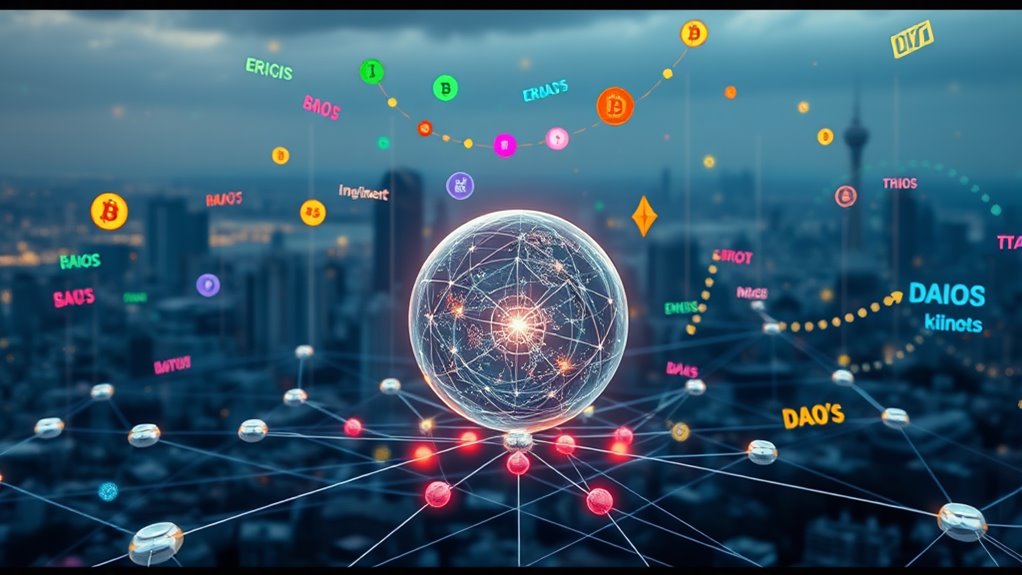
Diversity characterizes the evolving landscape of decentralized autonomous organizations, with distinct categories emerging to serve specific functions within the blockchain ecosystem.
These organizations vary in purpose, structure, and governance models.
The crypto space features several prominent DAO categories:
- Protocol DAOs like Compound and MakerDAO manage decentralized applications through governance tokens, playing vital roles in DeFi development.
- Project and Creator DAOs focus on product development and fractional NFT ownership respectively, with examples like Mirror enabling collaborative artistic endeavors.
- Investor and Specialized DAOs function as decentralized venture capital firms or serve particular niches, including curator groups for digital assets and guild formations that connect freelancers with blockchain projects.
Each type addresses specific community needs while maintaining the core principles of decentralized governance.
How Token Voting Systems Shape DAO Decision-Making

At the heart of every DAO’s operational framework lies its governance mechanism, with token voting systems emerging as the predominant model for collective decision-making. In these systems, governance tokens represent voting power proportional to ownership, allowing members to submit and vote on proposals.
While this model encourages transparency and community engagement, it faces significant challenges. Token concentration can lead to centralization, with large holders—often called “whales”—wielding disproportionate influence.
To address these issues, many DAOs implement alternative approaches, including quadratic voting to reduce whale dominance, reputation-based systems that reward contributions, and hybrid models combining multiple mechanisms.
Some DAOs also utilize vote-escrowed tokens (veTokens) that lock holdings for extended periods, demonstrating long-term commitment and discouraging manipulation of governance processes.
Smart Contracts: The Backbone of DAO Functionality

Smart contracts serve as the operational foundation of DAOs, functioning as self-executing code that automatically enforces rules and agreements without requiring intermediaries.
These digital protocols represent “code as law,” where predetermined conditions trigger actions, creating an automated trust system that reduces reliance on human judgment or third-party verification.
The blockchain-based nature of smart contracts guarantees transparency and immutability, allowing DAO members to confidently participate in collective governance with the assurance that decisions will be implemented exactly as programmed.
Code as Law
The foundation of every Decentralized Autonomous Organization rests upon the principle of “code as law,” where programmed rules embedded in smart contracts govern all operations and decisions.
This approach replaces traditional legal frameworks with executable code that automatically enforces agreements between participants.
Smart contracts serve three critical functions within DAOs:
- Automated Governance – They execute voting procedures and implement decisions without human intermediaries, reducing operational costs and potential errors.
- Treasury Management – Smart contracts control financial assets transparently, ensuring funds are allocated according to collective decisions.
- Rule Enforcement – Predefined conditions in the code create an immutable rulebook that applies equally to all participants, fostering trust through guaranteed execution.
This programmable governance system creates organizations that operate with unprecedented transparency and efficiency, though regulatory challenges persist as traditional legal systems adapt to this innovation. Additionally, smart contracts in DAOs reflect the principles of decentralized finance that enhance user empowerment in financial activities.
Automated Trust Systems
Every decentralized autonomous organization relies on automated trust systems to function effectively without centralized authority. At the core of these systems are smart contracts—self-executing agreements with rules encoded directly into blockchain-based software. These contracts automatically enforce predetermined conditions and execute transactions when specific requirements are met.
Smart contracts enable DAOs to operate with transparency and reliability by managing treasury funds, facilitating voting processes, and implementing community decisions. When DAO members vote on proposals, smart contracts tally results and, upon reaching consensus, automatically execute the approved actions. This automation eliminates the need for intermediaries and considerably reduces the risk of human error or manipulation.
For external data integration, DAOs utilize oracles that feed real-world information into smart contracts, enhancing decision-making capabilities and expanding the range of activities a DAO can effectively manage. Additionally, the principles of decentralized trading employed by Automated Market Makers (AMMs) can provide valuable insights into how DAOs can optimize their liquidity management and operational efficiency.
Real-World Applications and Success Stories

Across various industries, DAOs have emerged as powerful tools for decentralized governance and collective decision-making. These organizations demonstrate practical utility in diverse sectors:
- Financial Services – DeFi applications like lending platforms and decentralized exchanges allow users to trade, borrow, and earn interest without intermediaries, while projects like MakerDAO manage stablecoins through community governance.
- Supply Chain Management – Blockchain-based tracking systems increase transparency, reduce counterfeiting, and automate contractual obligations through smart contracts.
- Energy Distribution – DAOs enable peer-to-peer energy trading and decentralized grids, allowing users to sell excess energy directly to others and incentivizing renewable energy production.
Additional applications include transparent philanthropy with reduced administrative costs and educational platforms offering blockchain-verified credentials, showing DAOs’ versatility beyond theoretical concepts.
Challenges Facing DAOs in Today’s Landscape

Despite their promising applications, DAOs face significant challenges that shape their current development trajectory and adoption rates.
Technical vulnerabilities in smart contracts present serious security risks, as evidenced by historical hacks like The DAO in 2016.
Governance issues also plague many DAOs, with low participation rates and concentration of voting power among large token holders undermining their democratic ideals.
Voter apathy and plutocratic control threaten the democratic foundation that DAOs aspire to build.
Decision-making can become inefficient due to the need for widespread consensus.
Regulatory uncertainty presents another hurdle, as DAOs operate in a legal gray area without clear frameworks for taxation or liability.
This ambiguity makes integration with traditional systems difficult.
Additionally, the technical complexity of DAOs creates a significant barrier for non-technical users, limiting mainstream adoption despite ongoing efforts to improve user interfaces.
The Future Outlook for DAOs in DeFi and Beyond
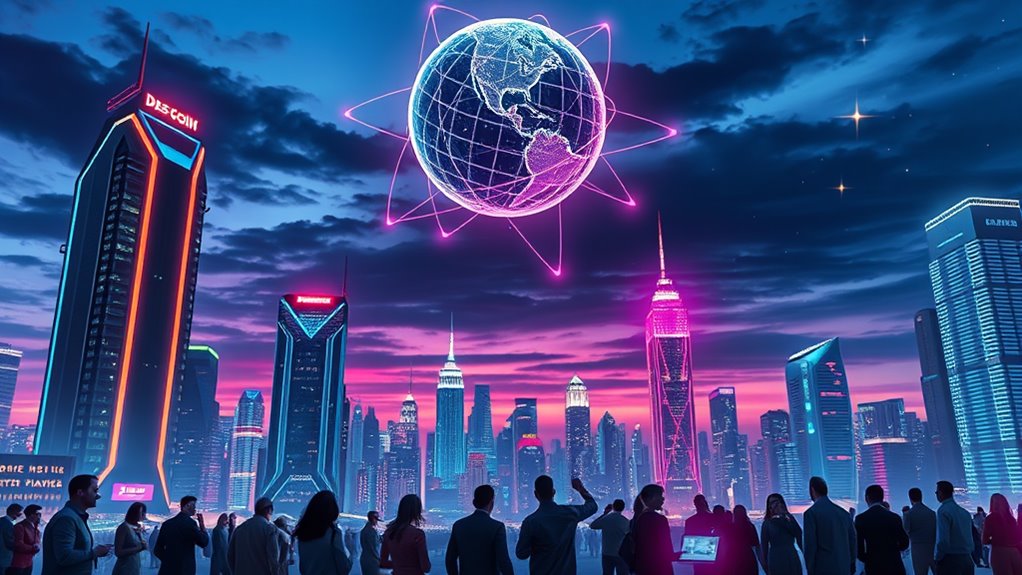
The future adoption of DAOs will require significant regulatory adaptation as current frameworks struggle to accommodate these decentralized entities.
Regulators worldwide are beginning to develop specialized approaches to DAOs, balancing innovation protection with necessary oversight.
Beyond finance, DAOs show tremendous cross-industry implementation potential in sectors including supply chain management, healthcare, real estate, and creative industries where transparency and collective decision-making offer substantial benefits.
Regulatory Adaptation Required
Nearly every regulatory framework governing traditional financial systems requires significant adaptation to effectively oversee the emerging landscape of DAOs and DeFi protocols.
The decentralized nature of these organizations creates unique challenges for regulators accustomed to centralized entities with clear accountability structures.
Key adaptations necessary include:
- Development of cross-jurisdictional approaches that address the borderless operation of DAOs while providing consistent regulatory expectations across countries.
- Implementation of technology-driven compliance solutions that can automate KYC/AML requirements without compromising decentralization principles.
- Creation of flexible frameworks capable of evolving alongside rapid technological innovations while still protecting users from smart contract vulnerabilities.
As courts increasingly recognize DAOs as legal entities, the pressure intensifies for both regulators and DAO participants to collaborate on sensible governance structures that balance innovation with compliance responsibilities. Furthermore, the ongoing debates about consumer protection highlight the critical need for robust frameworks that ensure users are safeguarded within this innovative ecosystem.
Cross-Industry Implementation Potential
Numerous industries beyond finance stand poised to benefit from DAO implementation, creating transformative opportunities across diverse sectors. Supply chain management leverages DAOs to enhance transparency and product traceability, while healthcare organizations utilize them for secure patient data management and expanded telemedicine access.
| Industry | DAO Application | Key Benefit |
|---|---|---|
| Supply Chain | Product tracking | Enhanced transparency |
| Healthcare | Patient data management | Improved data control |
| Social Impact | Community-driven projects | Transparent fund allocation |
The global DAOaaS market is projected to reach $680 million by 2033, driven by continuing technological advancements that integrate AI and machine learning to enhance decision-making processes. Despite implementation challenges related to interoperability across blockchain platforms, DAOs represent a paradigm shift in organizational structure that promises greater automation, reduced intermediaries, and community-centered governance.
Frequently Asked Questions
How Do You Calculate the Fair Value of DAO Tokens?
Fair value of DAO tokens is calculated using adapted traditional methods like DCF (modified as “Free Token Flow”), comparable analysis of similar DAOs, and consideration of token utility, market conditions, and blockchain ecosystem factors.
What Tax Implications Exist for DAO Token Holders?
DAO token holders face various tax implications including income tax on tokens received as rewards, capital gains tax when tokens are sold at a profit, and obligations to track fair market value for accurate reporting.
Can DAOS Be Integrated With Traditional Organizational Structures?
DAOs can be integrated with traditional organizations through hybrid models. These structures combine DAO’s decentralized governance with conventional hierarchies, allowing companies to leverage blockchain transparency while maintaining familiar operational frameworks and legal compliance.
What Happens if a Critical Smart Contract Fails?
Like a house of cards collapsing, a critical smart contract failure can result in financial losses, operational halts, governance disruptions, and erosion of trust. Emergency protocols and recovery mechanisms become essential for maintaining DAO viability.
How Can Individuals With Limited Technical Knowledge Participate Effectively?
Individuals with limited technical knowledge can participate effectively in DAOs through user-friendly interfaces, delegated voting mechanisms, community education resources, and by leveraging frameworks specifically designed to reduce technical barriers to engagement.
Conclusion
DAOs represent the next frontier in organizational design, combining blockchain technology with democratic principles to create transparent, trustless governance systems. Will these decentralized entities eventually replace traditional corporate structures? While challenges like regulatory uncertainty and coordination issues remain, DAOs continue to evolve, offering glimpses of a future where community-owned organizations operate globally without centralized control—potentially transforming how we collaborate, invest, and govern in the digital age.





